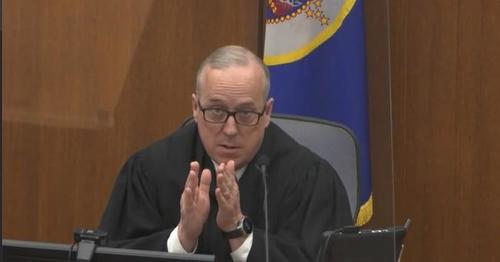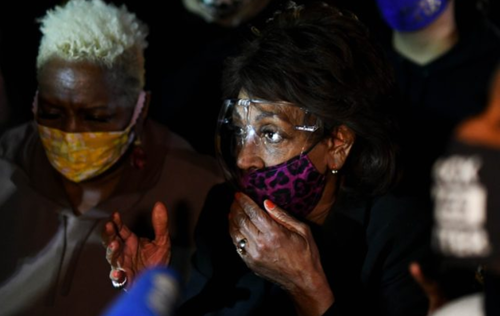
It’s been quite a few days for the millionaire south-central LA congresswoman. First she incites violence and questions the US judicial system, then violence takes place resulting in injuries, then she is denigrated for actions, and turns around and blames white supremacy for what she did and said. But, to be frank, all of that pales into insignificance relative to what could possibly happen next.
Having exclaimed that “we’re looking for a guilty verdict… as far as I am concerned it’s first degree murder,” Maxine Waters may be in hot water as the judge in the very same case regarding the death of George Floyd issued an ominous statement as the two sides finished closing arguments and handed the case to the jury.
Critically, Chauvin’s defense raised several concerns with the judge over outside influence impacting the jurors judgement… and that’s when the fireworks began.

As Townhall.com’s Spencer Brown details, Chauvin’s lawyers pointed out that jurors were not sequestered during the case and therefore may not be free from outside influence in the form of news updates they may have inadvertently or purposefully seen along with ongoing violence in the community surrounding the Chauvin trial and approaching verdict.
Among their concerns, Chauvin’s defense team pointed to Waters and her appearance with demonstrators in Brooklyn Center, Minnesota, over the weekend.
Even though the judge denied the defense’s motion for mistrial, he highlighted the damage her rhetoric may have done, saying “Congresswoman Waters may have given you something on appeal that may result in this whole trial being overturned.”
Chauvin trial Judge Peter Cahill responds to defense request for a mistrial over comments by Rep. Maxine Waters (D-CA):
“I’ll give you that Congresswoman Waters may have given you something on appeal that may result in this whole trial being overturned.” pic.twitter.com/jPp7zl0iGd
— The Recount (@therecount) April 19, 2021
The judge continued with a scorching message for Rep. Waters and other elected officials who have engaged in what he slams as “abhorrent” behavior disrespecting the rule of law and giving their opinion in a way that is inconsistent with their oath to the Constitution: (emphasis ours)
I’m aware of the media reports. I’m aware that Congresswoman Waters was talking specifically about this trial and about the unacceptability of anything less than a murder conviction and talking about being confrontational, but can you submit the press articles about that.
This goes back to what I’ve been saying from the beginning. I wish elected officials would stop talking about this case, especially in a manner that is disrespectful to the rule of law and to the judicial branch and our function.
I think if they want to give their opinions, they should do so in a respectful and in a manner that is consistent with their oath to the Constitution, to respect the co-equal branch of government.
Their failure to do so I think is abhorrent, but I don’t think it’s prejudiced us with additional material that would prejudice this jury. They have been told not to watch the news. I trust they are following those instructions and that there is not in any way a prejudice to the defendant beyond the articles that were talking specifically about the facts of this case.
Ultimately saying he trusted jurors to follow his instructions to them, the judge denied the defense’s motion for mistrial, adding “a congresswoman’s opinion really doesn’t matter a whole lot.”
Chauvin trial judge Cahill is visibly upset by elected officials like Rep. Maxine Waters (D-CA) sharing their opinions on the Floyd trial, but he believes it's not enough to constitute a mistrial. pic.twitter.com/G5kHpTXpU0
— The Recount (@therecount) April 19, 2021
Let’s hope he is right. Presumably, no lessons will be learned from his comments as Waters will simply look at the color of the judge’s skin and reject his criticism as simple systemic racism…
What’s the first thing Rep. Maxine Waters (D-CA) did after conservatives called her out for crossing state lines to incite violence in Brooklyn Center, MN, hours before the National Guard and police were targeted in a drive-by shooting?
Why, play the victim of course.
In Monday comments, Waters ripped GOP lawmakers for criticizing her – saying they are trying to “send a message” to white supremacists.
“I am nonviolent,” Waters told The Grio on Monday following a tweet by House Minority Leader Kevin McCarthy (R-CA) – who accused her of condoning political violence and using “dangerous rhetoric” when she told protesters to get more confrontational.”
“Maxine Waters is inciting violence in Minneapolis — just as she has incited it in the past. If Speaker Pelosi doesn’t act against this dangerous rhetoric, I will bring action this week,” McCarthy tweeted on Sunday.
Maxine Waters is inciting violence in Minneapolis — just as she has incited it in the past. If Speaker Pelosi doesn’t act against this dangerous rhetoric, I will bring action this week.
— Kevin McCarthy (@GOPLeader) April 19, 2021
In response, Waters said: “Republicans will jump on any word, any line and try to make it fit their message and their cause for denouncing us and denying us, basically calling us violent … any time they see an opportunity to seize on a word, so they do it and they send a message to all of the white supremacists, the KKK, the Oath Keepers, the [Proud] Boys and all of that, how this is a time for [Republicans] to raise money on [Democrats’] backs”.
Waters then said that she’s “not worried that they’re going to continue to distort what I say.”
“This is who they are and this is how they act,” she continued. “And I’m not going to be bullied by them.”
Of course, as constitutional scholar Jonathan Turley notes – Waters may have hoisted herself by her own petard. Read on…
With rioting continuing in Brooklyn Center, Minn. and around the country, Rep. Maxine Waters, D-CA, went to Minnesota and told the protesters that they “gotta stay on the street” and “get more confrontational.” The statement is ironic since Waters is one of the House members currently suing former President Donald Trump and others for inciting violence on January 6th with his words on the Mall. Waters insists that Trump telling his supporters to go to the Capitol to make their voice heard and “fight” for their votes was actual criminal incitement. Conversely, Waters was speaking after multiple nights of rioting and looting and telling protesters to stay on the streets and get even more confrontational. There was violence after the remarks, including a shooting incident where two National Guard members were injured.
Waters has now guaranteed that she could be called as a witness by Trump in his own defense against her own lawsuit.
Waters’ most recent words could well be cited in the ongoing litigation over the January 6th riot on Capitol Hill. As I have previously discussed, the lawsuit by House members and the NAACP may prove a colossal mistake. It is one of a number of lawsuits, including a lawsuit filed by Rep. Eric. Swalwell, D-Cal, that could ultimately vindicate Trump shortly before the next election. While it is possible that members could find a trial judge to rule in their favor, these lawsuits should fail on appeal, if they get that far. Moreover, they would fail under a lower standard of proof than the “beyond a reasonable doubt” standard in criminal law. Such a result would eviscerate the claim that Trump was guilty of criminal incitement in his speech.
After the riot, various legal experts appeared on news channels to proclaim that this was a strong if not conclusive case for criminal incitement. Trump was clearly guilty of criminal incitement. CNN legal analyst Elie Honig declared “As a prosecutor I’d gladly show a jury Trump’s own inflammatory statements and argue they cross the line to criminality.” Richard Ashby Wilson, associate law school dean at the University of Connecticut, said “Trump crossed the Rubicon and incited a mob to attack the U.S. Capitol as Congress was in the process of tallying the Electoral College vote results. He should be criminally indicted for inciting insurrection against our democracy.” District of Columbia Attorney General Karl Racine then thrilled many by declaring that he was investigating Trump for a possible incitement charge.
As I have previously written, these statements ignored both the elements of that crime and controlling case law. Notably, while these and other experts insisted that the crime of incitement was obvious and public on Jan. 6th, there has been no charge brought against Trump despite over four months. Why?
The reason is that an actual criminal case would lead to a rejection of not just the charge but the basis for the second Trump impeachment. Trump’s Jan. 6 speech would not satisfy the test in Brandenburg v. Ohio, where the Supreme Court stressed that even “advocacy of the use of force or of law violation” is protected unless it is imminent. Trump did not call for the use of force but actually told people to protest “peacefully” and to “cheer on” their allies in Congress. After violence erupted, Trump later told his supporters to respect and obey the Capitol Police.
Now Waters, Swalwell, and others are rushing in where wiser Democrats fear to tread. These civil lawsuits actually raise claims like the infliction of emotional distress that were directly and unequivocally rejected by the Supreme Court. In 2011, the court ruled 8-1 in favor of Westboro Baptist Church, an infamous group of zealots who engaged in homophobic protests at the funerals of slain American troops. In rejecting a suit against the church on constitutional grounds, Chief Justice John Roberts wrote: “Speech is powerful. It can stir people to action, move them to tears of both joy and sorrow, and — as it did here — inflict great pain. On the facts before us, we cannot react to that pain by punishing the speaker.”
Yet, Waters is not more deterred by the actual case law in this area than the legal experts on CNN and MSNBC. Indeed, Waters has gone further and insisted that Trump should not only be charged with criminal incitement but actual “premeditated murder.” She stated, “For the President of the United States to sit and watch the invasion and the insurrection and not say a word because he knew he had absolutely initiated it – and as some of them said, ‘he invited us to come.”
That bring us back to Brooklyn Center this weekend. Violence and looting have been unfolding around the country, including the near the area where Waters was speaking. Yet, she called on people to stay in the streets and get more “confrontational.” She added that there would be no acceptance of court decisions to the contrary in the Chauvin case: “We’re looking for a guilty verdict. If we don’t, we cannot go away.” Protesters have not only been camped around the courthouse but the home of a witness in the Chauvin case was targeted. (It turned out to be his former home). Critics could charge that Waters’ statement and these protests are meant to intimidate witnesses or influence the trial — just as critics charged that Trump was attempting to intimidate or influence Congress.
After Waters remarks, protesters confronted reporters in a tense scene. Also protesters descended upon the home of the prosecutor responsible for the second degree manslaughter charge against the officer who killed Daunte Wright. Also the Minnesota National Guard was fired upon, injuring at least two Guardsman. That is not to say that Water incited such actions but that the same claimed nexus could be raised in making such an allegation as was done in the Trump impeachment.
In my view, those words are political speech and should not be subject to criminal sanctions. However, I felt the same way about Trump’s speech (which I condemned as he was giving it on Jan. 6th as reckless). I also rejected prior claims against Waters like when she encouraged protesters to confront Trump officials in restaurants and “push back on them and you tell them they’re not welcome anymore, anywhere.” It is all protected speech.
Yet, that standard cannot be selectively applied to some but not all riots or protests. Waters was encouraging protesters to continue to fight for what they believe in. Her over-heated rhetoric could easily be seen by some as an invitation or endorsement for rioting. However, criminalizing such speech would shred the guarantees of free speech in our country.
Carl Jung once said that “Everything that irritates us about others can lead us to an understanding of ourselves”. That certainly seems to be the case with Waters and Trump. It is also why Waters could prove the only witness that Trump needs to call to defeat her own lawsuit.
Via Zero Hedge



